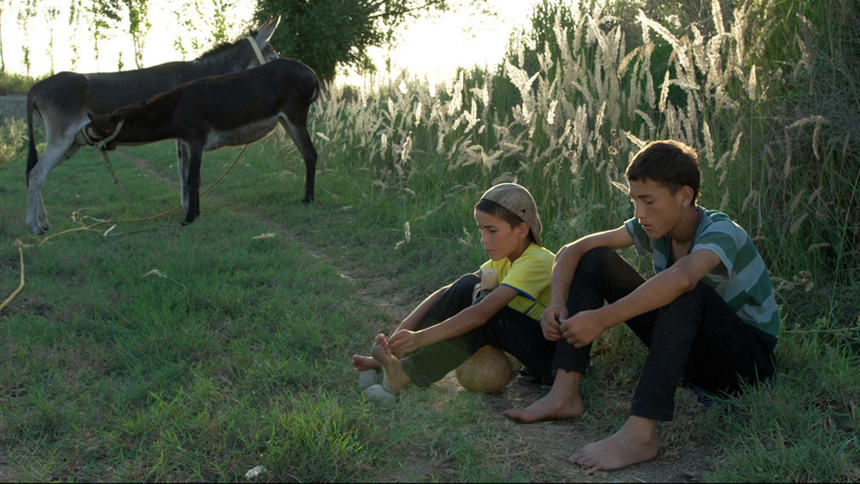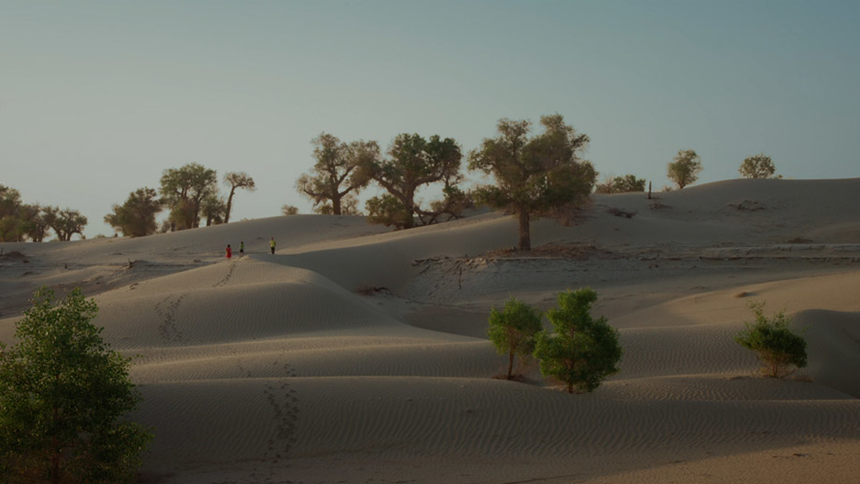Udine 2019 Review: A FIRST FAREWELL, Tenderly Observed Drama About Uyghur Children In Xinjiang

Awarded the Grand Prix of the Generation Kplus section at the 2019 Berlinale, A First Farewell is a tenderly observed and quiet drama about the day-to-day struggles of China’s Uyghur ethnic minority in the Muslim-dominated Xinjiang province.
This is an impressive debut by Chinese director and Xinjiang-born Lina Wang, who documents the slow, gentle undulations of rural indigenous life in the mountains in rich and striking detail. What’s most evident is the real compassion that Wang demonstrates towards the plights of her young characters – played to perfection by non-professional child actors – whose cocooned existence gradually comes under siege by mounting pressures to conform to a collective Chinese national identity.
Young Isa (Isa Yasan) lives in an Uyghur village in northwestern China, spending his days doing farm chores, going to school, and taking care of his deaf-mute mother with his older brother Musa (Musa Yasan), who is about to head to the city for university. He is best friends with sprightly little girl Kalbinur (Kalbinur Rahmati) – the pair take care of a little lamb together and go about exploring the vast surroundings landscapes alongside Kalbinur’s kid brother.
Wang paints the unique culture of the Uyghur village community, one where the social fabric encompasses the agriculture livelihoods of harvesting cotton and nomadic herding, having naan for tea, singing traditional Uyghur songs and observing religious Islamic holidays. While the pace of life is tranquil and undisturbed, there’s a surficial simmering of her characters’ underlying anxieties at being left behind in an increasingly homogeneous China.
The nation’s treatment towards the minority group has been a contentious human-rights issue in recent years, with claims of Uyghurs being forced into re-education camps and migration of the Han Chinese over to dilute the native population. But there’s none of this in A First Farewell, which avoids descending into overtly political territory; instead, Wang has chosen to build the plot around the children’s difficulties in keeping up with the Mandarin-based educational system imposed by their village schools.
It’s a problem that appears straightforward enough on the surface, yet one that shrewdly unravels the larger sociocultural and economic repercussions brought about by the politics of language. The burden of mastering Mandarin imposed on the children trickles down to the entire family unit, and parents are held responsible for their futures: there is a painfully unforgettable scene where a teacher forces Kalbinur and her mother to stand up, before publicly chastising them for the former’s abysmal Mandarin grades. Kalbinur’s tears flow freely, while her mother can only hang her head in shame.
“I didn’t realise how important Mandarin is. You need Mandarin everywhere,” laments Kalbinur’s mother to her husband, recognising the economic viability that language assimilation offers. It is this desire to give her children a future of upward social mobility that eventually drives her to move the family to the faraway town of Kuqa, which has Mandarin-only schools.
But not everyone can so readily pack up and leave. Isa, on the other hand, is rooted to his home because of his ailing mother. Their relationship is movingly portrayed in A First Farewell, with child actor Yasan playing the young boy with unfeigned purity. Mature beyond his age, yet still a child of wide-eyed innocence longing for maternal love, Isa is selflessly determined to care for his mother and have her by his side at the expense of his education. When his father sends her away to a nursing home later on, his subsequent devastation is heartbreaking at all levels.
Not only does A First Farewell serve as Wang’s personal ode to the unspoilt natural beauty of her hometown, the landscapes are used exceptionally to draw out her young characters’ isolation and sheltered lives from the larger world. Long shots frequently capture the children in stark relation to the stunning mountainous environment across four seasons, as they traverse uphill desert dunes, skip along the edge of deep valleys or perch on the branches of a blooming poplar tree among orange-speckled autumn fields. In these scenes, Isa and Kalbinur are rendered vulnerable, tiny specks in the grander scheme of the universe, one where the security of their futures is decked with a looming question mark.
The film's title, A First Farewell, takes on multiple meanings – it is not just one parting, but several physical partings that Isa has to face: parting with his mother, parting with his brother Musa who is off to university, parting with his best friend Kalbinur who is moving away for better opportunities, parting with the little lamb he raised. On a deeper and symbolic level, it’s a farewell to his childhood innocence, and an impending farewell to the most rudimentary and integral parts of his own ethnic identity, all that he has ever known.


Do you feel this content is inappropriate or infringes upon your rights? Click here to report it, or see our DMCA policy.






